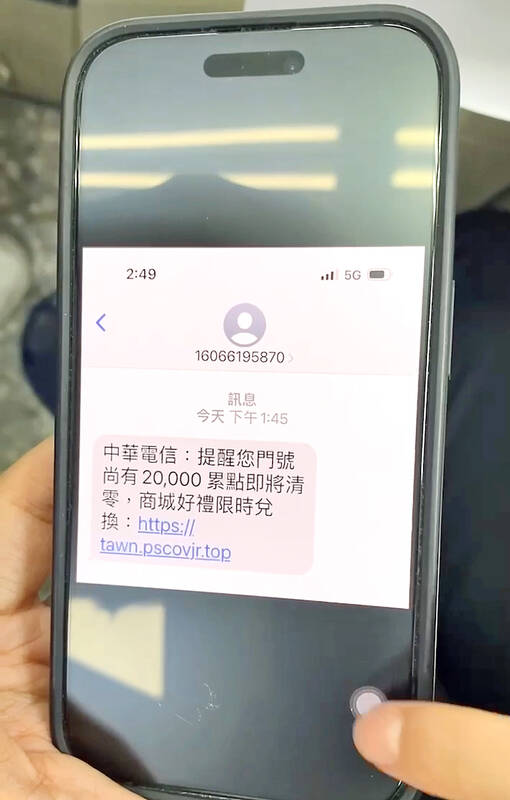Regulatory changes mean that telecoms are required to monitor people who send more than 50 text message a day and check the purpose of such activity, the National Communications Commission said this week.
The commission in June last year updated its Guidelines for Risk Management Mechanism for Telecom Businesses to Accept Telecommunications Services Application (電信事業受理申辦電信服務風險管理機制指引) as part of government efforts to deter telephone scams, in particular taking aim at the practice of acquiring multiple phone numbers, which makes tracking down fraudsters more difficult.
Changes to the guidelines require telecoms to get two forms of ID from people who apply for services.

Photo copied by Huang Liang-chieh, Taipei Times
This year, the commission promulgated the Management Measures for Telecommunication Service User Numbers (電信事業用戶號碼使用管理辦法) to ensure that telecoms properly manage the phone numbers they control.
The commission recently revised the regulations to reinforce rules for text messages.
Scammers often send a lot of text messages that contain suspicious links, the commission said.
People who open the links could unknowingly have malware installed on their device that turns them into a hub that sends more scam messages, it said.
The new rules require telecoms to adopt risk management measures for non-commercial short message services (SMS).
If the number of short messages sent by a regular user exceeds reasonable expectations, telecoms should activate the mechanism to immediately restrict access to SMS functions, the rules say.
Telecoms estimate that people send at most 50 messages per day, so the guidelines make that a reference by which telecoms can determine when to scrutinize activity, they say.
However, there is some leniency in the rules.
If a “whitelist customer” — whose access to telecom services has never been restricted by judicial authorities — sends more than 50 text messages a day, a telecom can slightly increase the cap for them, after assessing the risk, the rules say.
However, for those who exceed the cap and have faced judicial penalties, telecoms should inquire about the purpose of sending a lot of text messages and review the information, they say.
Telecoms should determine whether the user’s device has been hijacked to forward scam messages, they say.
Telecoms can turn off SMS functions if they detect abnormal or illegal activity, the commission said, adding that operators must update their contracts to explain the SMS limits.

A preclearance service to facilitate entry for people traveling to select airports in Japan would be available from Thursday next week to Feb. 25 at Taiwan Taoyuan International Airport, Taoyuan International Airport Corp (TIAC) said on Tuesday. The service was first made available to Taiwanese travelers throughout the winter vacation of 2024 and during the Lunar New Year holiday. In addition to flights to the Japanese cities of Hakodate, Asahikawa, Akita, Sendai, Niigata, Okayama, Takamatsu, Kumamoto and Kagoshima, the service would be available to travelers to Kobe and Oita. The service can be accessed by passengers of 15 flight routes operated by

MORE FALL: An investigation into one of Xi’s key cronies, part of a broader ‘anti-corruption’ drive, indicates that he might have a deep distrust in the military, an expert said China’s latest military purge underscores systemic risks in its shift from collective leadership to sole rule under Chinese President Xi Jinping (習近平), and could disrupt its chain of command and military capabilities, a national security official said yesterday. If decisionmaking within the Chinese Communist Party has become “irrational” under one-man rule, the Taiwan Strait and the regional situation must be approached with extreme caution, given unforeseen risks, they added. The anonymous official made the remarks as China’s Central Military Commission Vice Chairman Zhang Youxia (張又俠) and Joint Staff Department Chief of Staff Liu Zhenli (劉振立) were reportedly being investigated for suspected “serious

ENHANCING EFFICIENCY: The apron can accommodate 16 airplanes overnight at Taoyuan airport while work on the third runway continues, the transport minister said A new temporary overnight parking apron at Taiwan Taoyuan International Airport is to start operating on Friday next week to boost operational efficiency while the third runway is being constructed, the Ministry of Transportation and Communications said yesterday. The apron — one of the crucial projects in the construction of the third runway — can accommodate 16 aircraft overnight at the nation’s largest international airport, Minister of Transportation and Communications Chen Shih-kai (陳世凱) told reporters while inspecting the new facility yesterday morning. Aside from providing the airport operator with greater flexibility in aircraft parking during the third runway construction,

Taiwanese and US defense groups are collaborating to introduce deployable, semi-autonomous manufacturing systems for drones and components in a boost to the nation’s supply chain resilience. Taiwan’s G-Tech Optroelectronics Corp subsidiary GTOC and the US’ Aerkomm Inc on Friday announced an agreement with fellow US-based Firestorm Lab to adopt the latter’s xCell, a technology featuring 3D printers fitted in 6.1m container units. The systems enable aerial platforms and parts to be produced in high volumes from dispersed nodes capable of rapid redeployment, to minimize the risk of enemy strikes and to meet field requirements, they said. Firestorm chief technology officer Ian Muceus said